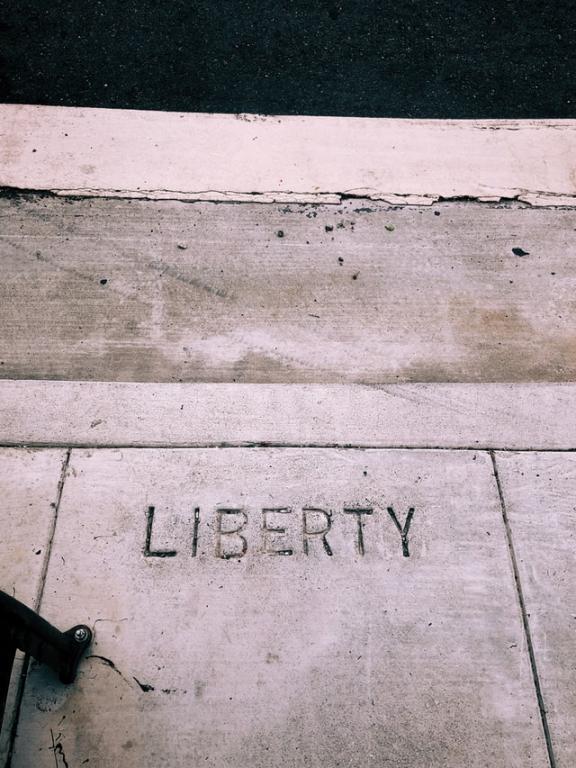
I think it is truly beautiful to see others care for those they do not know. The empathy and energy that it requires is sometimes more than I am willing to extend, sometimes. It’s a problem I have- I am detached from so much that it is both a strength and a weakness. To a point, it can appear as though I am nihilistic, perhaps even numb to the pain and suffering of the world. I am not numb. I am just detached.
When I was little, I cried about everything I saw on the news. Every atrocity that was broadcast affected me deeply. The pain of others became my pain. The suffering of others caused me to suffer. I think that is a gift from the Creator, although, at the time, I didn’t see it like that. As I matured, I had to teach myself to detach—because as many empaths know, suffering for others can become a heavy burden.
Seeing suffering take place can do many things to a person. It can make them feel a plethora of emotions, that if not regulated, can push a person to extremism. People take on the suffering of others and make it their own so that they can justify their contempt.
Others can take on the suffering and it can create an enormous anxiety that it makes it difficult for true connections to take place. As a person endures their suffering, they have the potentiality to create good or evil from it.
I know I cannot end suffering. I accepted this. I can transform my own suffering and hope to transform the suffering of others, but I cannot effectively stop suffering—not for myself and not for others, not entirely.
And as much as I want to find someone to blame for suffering that appears as though it could be ended, doing so really doesn’t end anything. In some instances, blaming someone or something can cause more conflict. And then what happens if we blame the wrong person or thing?
Suffering & Scapegoating
2,000 years ago, groups of people blamed Jesus for leading people astray. Christ on the Cross was the definitive scapegoat. An innocent scapegoat was sacrificed. But, not even that could stop the Good News.
I too, once felt compelled to speak out against every injustice that I witnessed or heard about. I too, felt convicted by something greater, to condemn all that is evil. But what I learned by solely focusing on what or who to condemn, is that it still didn’t remedy the problem. Pointing fingers only gets you so far. Scapegoating doesn’t necessarily provide you with solutions.
I see that taking place with society. We are pointing to all the scapegoats. We are trying to identify who we are to blame and project our anger and frustration and lamentations at. But what resolve does it truly provide for us? Are there solutions, or just accusations?
You Don’t Know Suffering
What happens when no one believes you are suffering or have suffered? What do we do when we express our suffering but another tells us that it’s not really suffering? Or, that it’s not a suffering worth concerning oneself with because it pales in comparison to the suffering of another?
Wouldn’t it be wonderful if we could remain unaffected by evils of this world? Wouldn’t it be lovely if some truly never experiences suffering at all? It would be nice if we could all go about our days and live in a utopia filled with compliments and praises. Where we only edified all those we interacted with and stopped to help every person who dropped their groceries or mail?
Sadly, such utopias are not fully attainable for us in this world. I mean, I hope that one day we learn how to effectively bring heaven to earth, but I don’t see that taking place so long as I am alive. But, there is hope that my grandson will one day see a utopia that I only dream of.
The truth is, we are all affected by so much suffering that to measure one person’s suffering against another would be irrelevant to any cause of injustice worth correcting. More than that, it’s unconscionable that one would even have a desire to compare the suffering of one to the suffering of another.
Who has suffered more? Is it you or is it me, and does our skin color qualify our suffering? Does our sexual identity qualify our suffering? Does our sex/gender qualify our suffering?
Suffering the Past
Should we measure that suffering? Should we blame another for the suffering we have endured? And if we find just-cause to blame another for our own suffering, does that provide any sort of relief for the suffering of our past? And furthermore, does that mean that I have carry all suffering around with me?
The quick answer is no. The past does not define me. The past is no longer witness to my present. The past is gone. I only have this moment. That means I must move past my suffering. Which ultimately means that I must let go of my past.
With that being said, I don’t think that bringing up the past and using it as an example to compare what we are experiencing now is a detriment to healing and forgiveness. We must be able to look at things that happened in the past and use it as a way to ask ourselves: “Hey, have I have been through this before? What did I learn then that I can apply to this moment of suffering?”
And if we don’t or can’t move past our suffering—then what? It swallows us whole. It fills us with resentment. It fills us with hatred and contempt. It prevents us from actually moving forward because we suffer in the past.
The Suffering Servant
Jesus suffered. Immensely. But what if all that he suffered was the physical pain? What if he centered himself within the pain and nothing more? What if Jesus was able to fulfill God’s will by learning to let go of the resentment and the contempt and blame so that the will of the Father could be completed?
How would Jesus have done this? How could he do this knowing that he was innocent, knowing he did nothing wrong in actuality? Perhaps, because Jesus knew that if he didn’t let go of the contempt and blame and shame, that he would not be able to receive all of the love of God. Had Jesus refused to let go of the contempt, he would not have been remarked as “the true Son of God” as it was declared in the Gospel.
While he suffered, he forgave all. “Father forgive them, for they know not what they do”. He knew, that despite how much hatred and fear that had gripped the hearts of those who had wanted him dead, that it was not entirely their fault. He knew that they just did not understand how to love. He knew that he must forgive in order to end his suffering and, eventually, the suffering of all.
Probably not an easy task. He rightfully knew he was innocent, yet he embraced the suffering without contempt. He did not say, with his dying breath: “Father, I know who is to blame and all should remember who to blame.” Instead, he acknowledged that “they do not know”.
It’s a seemingly cruel thing to suggest, that we are all to learn how to endure our suffering without contempt. We are human, our ego tells us we ought to blame someone, anyone, so that we can release ourselves from the suffering. But that’s not what Jesus showed us. And while many would say “Jesus told us to stand up to injustice and fight for those who do not have the strength to fight,” Jesus never provided a path to do so without suffering.
The World and All of Creation Suffers
The nature of the world is suffering. All living creations suffer. Even a very seed, planted in the ground, must go through a vicious death—the seed must literally burst and break and die in order for it to birth a stem that will grow into a flower.
Do we call a gardener a monster for making a seed go through such a violent death in order to produce a blossom? Not at all.
When any creature gives birth, it is a horrible, excruciating pain. It wreaks havoc on the entire body, mentally and physically. It is almost unbearable. It is suffering. But then, life is brought forth, and the suffering slowly dissipates.
But does suffering end after giving birth? Never. For humans, raising a child is an immense suffering. We give birth to suffering! But do we blame the man that impregnates us? Do we point the finger at the man and say “this is all your fault?” (Well, some do, in the moment, only later to retract).
But what good would it be for me to hold on to the pain of childbirth? It blocks the potentiality of love because I cling to the pain of the moment when life came forth. If I see that birth as a blockade to my happiness, then I will never experience happiness.
And I possibly won’t ever give birth again. Because I am clinging to my past—to the pain and the contempt. Which effectively thwarts life itself. Which effectively and essentially thwarts love.
Don’t Compare
The Parable of the Workers in the Vineyard demonstrates why we should not compare our suffering. I think we should revisit these verses for further consideration.
Perhaps you are familiar with Matthew 20:1-16?
For the kingdom of heaven is like a landowner who went out early in the morning to hire workers for his vineyard. He agreed to pay them a denarius for the day and sent them into his vineyard.
About nine in the morning he went out and saw others standing in the marketplace doing nothing. He told them, ‘You also go and work in my vineyard, and I will pay you whatever is right.’ So they went.
He went out again about noon and about three in the afternoon and did the same thing. About five in the afternoon he went out and found still others standing around. He asked them, ‘Why have you been standing here all day long doing nothing?’
‘Because no one has hired us,’ they answered.
He said to them, ‘You also go and work in my vineyard.’
When evening came, the owner of the vineyard said to his foreman, ‘Call the workers and pay them their wages, beginning with the last ones hired and going on to the first.’
The workers who were hired about five in the afternoon came and each receive a denarius. So when those came who were hired first, they expected to receive more. But each one of them also received a denarius. When they receive it, they began to grumble against the landowner. ‘These who were hired last worked only one hour,’ they said, ‘and you have made them equal to us who have borne the burden of the work and the heat of the day.’
But he answered one of them, ‘I am not being unfair to you, friend. Didn’t you agree to work for a denarius? Take your pay and go. I want to give the one who was hired last the same as I gave you. Don’t I have the right to do what I want with my own money? Or are you envious because I am generous?’
So the last will be first, and the first will be last.
In heaven, the hierarchies are transgressed. The last shall be the first, and the first shall be the last. In our world, the last are always last and the first are always first. But perhaps there aren’t really any hierarchies at all? Effectively, God will sort it all out. God is generous and loves us all. The first and the last, the last and the first. It is us who believe we are more deserving of others because we have suffered more, not God.
Life Sucks
Growing up, my mother was sure to be honest and forthcoming with me. Her mantra, which at the time, seemed so hostile and unrelenting, proved effective and beneficial as I matured. At least weekly, but perhaps daily, my mother would reiterate: “Life sucks. Accept it and move on.” My mother didn’t want me to live in the past. She wanted me to embrace my present so that I could enjoy my future.
The legendary abolitionist, social reformer, and writer Frederick Douglass once said, “If there is no struggle, there is no progress.” It’s an affirmation that quickly reminds us all that change does not come from a place comfort. And since change is new and the past is old, that means that we cannot live in the past.
Living in the past and remembering the past are two distinctly different phenomena. Living in the past prevents me from embracing my present. Remembering the past allows me to gauge how I deal with the present.
I don’t believe that most people aim to forget the past. More so, most people try to let go of the contempt of the past. What good does it do any of us if we carry around the baggage and burden of past—in any instance? It jades us. It prevents us from perceiving things with a different lens. It prevents us from seeing the good in people, too.
The ability to look for the good in all people is a principle teaching of Christ. That’s what Jesus demonstrated when he ate with the sinners. The Pharisees, specifically, perceived that because certain types of people did certain types of things, that they were sinners and irredeemable. Inherently evil, inherent sinners. As if they had no ability to be transformed nor to repent and turn away from their sin.
Jesus, however, demonstrated that you have to actually connect with people to understand them and influence them to change. And you don’t do that by attacking, labeling, or insulting them. You do that by meeting them in the moment—the present moment— and looking beyond the labels and the sin.
Recorded Conversations is now available for your listening pleasure!












